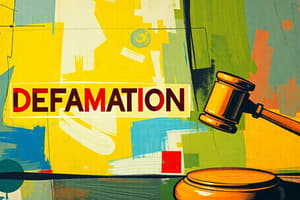Podcast
Questions and Answers
What was the date of the breaking news story that emphasized the need for responsible journalism?
What was the date of the breaking news story that emphasized the need for responsible journalism?
- May 15, 2010
- April 15, 2009
- April 29, 2010
- May 15, 2009 (correct)
The claimant demanded only an apology without any associated damages.
The claimant demanded only an apology without any associated damages.
False (B)
What type of damages did the claimant seek in his lawsuit?
What type of damages did the claimant seek in his lawsuit?
libel damages including exemplary and aggravated damages
During the 'This Morning' programme, a major incident was said to involve a current senior politician and a former senior retired politician involving __________ diplomats.
During the 'This Morning' programme, a major incident was said to involve a current senior politician and a former senior retired politician involving __________ diplomats.
Which of the following remedies was NOT listed among the claimant's demands?
Which of the following remedies was NOT listed among the claimant's demands?
The offending words were only broadcast during the 'This Morning' programme.
The offending words were only broadcast during the 'This Morning' programme.
What was the claimant's action on the 29th of April 2010?
What was the claimant's action on the 29th of April 2010?
What does the 2013 Defamation Act in Jamaica primarily focus on?
What does the 2013 Defamation Act in Jamaica primarily focus on?
Match the following elements of the claimant's demands with their descriptions:
Match the following elements of the claimant's demands with their descriptions:
Before the 2013 Defamation Act, individuals could not be criminally prosecuted for libel in Jamaica.
Before the 2013 Defamation Act, individuals could not be criminally prosecuted for libel in Jamaica.
What is the primary legal action for someone who believes they have been defamed under the 2013 Defamation Act?
What is the primary legal action for someone who believes they have been defamed under the 2013 Defamation Act?
A defamatory statement must be communicated to a ______.
A defamatory statement must be communicated to a ______.
Match the elements of defamation with their definitions:
Match the elements of defamation with their definitions:
What effect has the 2013 Defamation Act had on journalists in Jamaica?
What effect has the 2013 Defamation Act had on journalists in Jamaica?
Defamation cases in Jamaica are handled as criminal matters.
Defamation cases in Jamaica are handled as criminal matters.
What was a common criticism of the approach to defamation law before the 2013 Defamation Act?
What was a common criticism of the approach to defamation law before the 2013 Defamation Act?
What type of privilege protects statements made by MPs during parliamentary proceedings?
What type of privilege protects statements made by MPs during parliamentary proceedings?
Qualified privilege provides unconditional protection for statements made in good faith.
Qualified privilege provides unconditional protection for statements made in good faith.
What was the outcome of the case between Dr. Peter Phillips and Shanice Reid?
What was the outcome of the case between Dr. Peter Phillips and Shanice Reid?
In Jamaican law, statements made in __________ proceedings are protected under absolute privilege.
In Jamaican law, statements made in __________ proceedings are protected under absolute privilege.
Which of the following is NOT a context where absolute privilege applies?
Which of the following is NOT a context where absolute privilege applies?
What does defamation involve?
What does defamation involve?
Match the following terms with their definitions:
Match the following terms with their definitions:
The Defamation Act of 1952 included provisions for digital defamation.
The Defamation Act of 1952 included provisions for digital defamation.
The statute of limitations for defamation cases has been increased to five years to allow for more time in legal actions.
The statute of limitations for defamation cases has been increased to five years to allow for more time in legal actions.
What challenges does digital media present in defamation law?
What challenges does digital media present in defamation law?
What are the two separate legal offenses traditionally recognized under defamation?
What are the two separate legal offenses traditionally recognized under defamation?
The Defamation Act of 2013 merged libel and slander into a single offense called _____ .
The Defamation Act of 2013 merged libel and slander into a single offense called _____ .
Why was reform of the Defamation Act considered necessary?
Why was reform of the Defamation Act considered necessary?
Match the following defamation terms with their definitions:
Match the following defamation terms with their definitions:
What was the statute of limitations for civil claims in the Defamation Act of 2013?
What was the statute of limitations for civil claims in the Defamation Act of 2013?
The Defamation Act of 2013 abolished criminal libel to focus on civil remedies.
The Defamation Act of 2013 abolished criminal libel to focus on civil remedies.
What is a defense to defamation that is applicable if the statement is found to be true?
What is a defense to defamation that is applicable if the statement is found to be true?
Qualified privilege allows statements to be made without malice in public interest.
Qualified privilege allows statements to be made without malice in public interest.
What challenges does digital media pose to defamation law?
What challenges does digital media pose to defamation law?
Freedom of Expression is protected under Section 13 of the Jamaican Constitution and the Universal Declaration of Human Rights (Article ___).
Freedom of Expression is protected under Section 13 of the Jamaican Constitution and the Universal Declaration of Human Rights (Article ___).
Match the following rights with their descriptions:
Match the following rights with their descriptions:
Which of the following best describes the balancing act in defamation law?
Which of the following best describes the balancing act in defamation law?
Innocent dissemination means the distributor is aware of defamatory content.
Innocent dissemination means the distributor is aware of defamatory content.
Give one example of a scenario where protection of reputation is relevant.
Give one example of a scenario where protection of reputation is relevant.
What is one of the defenses in defamation cases?
What is one of the defenses in defamation cases?
Truth is not a valid defense in defamation cases.
Truth is not a valid defense in defamation cases.
What was the outcome of the case Moses Davis (Beenie Man) vs. Nationwide News Network?
What was the outcome of the case Moses Davis (Beenie Man) vs. Nationwide News Network?
The Defamation Act of 2013 seeks to balance freedom of expression and the protection of an individual's __________.
The Defamation Act of 2013 seeks to balance freedom of expression and the protection of an individual's __________.
Match the terms with their definitions:
Match the terms with their definitions:
Which of the following is a recommended policy for handling defamation in media?
Which of the following is a recommended policy for handling defamation in media?
The abolition of criminal libel guarantees complete protection against reputational harm.
The abolition of criminal libel guarantees complete protection against reputational harm.
What social issue has made defamatory statements spread quickly according to the discussed content?
What social issue has made defamatory statements spread quickly according to the discussed content?
Flashcards
Defamation
Defamation
Making a false statement about someone that harms their reputation.
Libel
Libel
Written defamation, such as in a newspaper or book.
Slander
Slander
Spoken defamation, such as rumors spread verbally.
Defamation Act of 1952
Defamation Act of 1952
Signup and view all the flashcards
Why was the Defamation Act reformed?
Why was the Defamation Act reformed?
Signup and view all the flashcards
Defamation Act of 2013
Defamation Act of 2013
Signup and view all the flashcards
Statute of Limitations
Statute of Limitations
Signup and view all the flashcards
Criminal Libel
Criminal Libel
Signup and view all the flashcards
Abolished Criminal Libel
Abolished Criminal Libel
Signup and view all the flashcards
Civil Defamation
Civil Defamation
Signup and view all the flashcards
Defamation Act (2013)
Defamation Act (2013)
Signup and view all the flashcards
Public Interest Reporting
Public Interest Reporting
Signup and view all the flashcards
Key Elements of Defamation
Key Elements of Defamation
Signup and view all the flashcards
Compensation for Harm
Compensation for Harm
Signup and view all the flashcards
Balance Freedom of Speech and Reputation
Balance Freedom of Speech and Reputation
Signup and view all the flashcards
Truth as a Defense
Truth as a Defense
Signup and view all the flashcards
Absolute Privilege
Absolute Privilege
Signup and view all the flashcards
Qualified Privilege
Qualified Privilege
Signup and view all the flashcards
Honest Opinion
Honest Opinion
Signup and view all the flashcards
Innocent Dissemination
Innocent Dissemination
Signup and view all the flashcards
Balancing Freedom of Expression and Reputation
Balancing Freedom of Expression and Reputation
Signup and view all the flashcards
Digital Media Challenges
Digital Media Challenges
Signup and view all the flashcards
Statute of Limitations Reduction
Statute of Limitations Reduction
Signup and view all the flashcards
Defamatory Words
Defamatory Words
Signup and view all the flashcards
Exemplary Damages
Exemplary Damages
Signup and view all the flashcards
Aggravated Damages
Aggravated Damages
Signup and view all the flashcards
What was the claimant's demand?
What was the claimant's demand?
Signup and view all the flashcards
What was the main news story?
What was the main news story?
Signup and view all the flashcards
What was the name of the program?
What was the name of the program?
Signup and view all the flashcards
When and where did the news story occur?
When and where did the news story occur?
Signup and view all the flashcards
What is the difference between absolute and qualified privilege?
What is the difference between absolute and qualified privilege?
Signup and view all the flashcards
How does the Defamation Act of 2013 affect digital platforms?
How does the Defamation Act of 2013 affect digital platforms?
Signup and view all the flashcards
What is the impact of digital media on defamation law?
What is the impact of digital media on defamation law?
Signup and view all the flashcards
What is the statute of limitations for defamation claims?
What is the statute of limitations for defamation claims?
Signup and view all the flashcards
What is the balance between freedom of speech and protection of reputation?
What is the balance between freedom of speech and protection of reputation?
Signup and view all the flashcards
How does the Peter Phillips vs. Shanice Reid case illustrate this balance?
How does the Peter Phillips vs. Shanice Reid case illustrate this balance?
Signup and view all the flashcards
Fair Comment
Fair Comment
Signup and view all the flashcards
Privilege in Defamation
Privilege in Defamation
Signup and view all the flashcards
Moses Davis (Beenie Man) Case
Moses Davis (Beenie Man) Case
Signup and view all the flashcards
Journalistic Responsibility
Journalistic Responsibility
Signup and view all the flashcards
Public Education on Defamation
Public Education on Defamation
Signup and view all the flashcards
Legal Updates for Defamation
Legal Updates for Defamation
Signup and view all the flashcards
Support for Defamation Victims
Support for Defamation Victims
Signup and view all the flashcards
Study Notes
The Defamation Act
- The Defamation Act in Jamaica aims to explore the history, key issues, and changes in the Act.
- It analyzes significant defamation cases to understand their implications.
- This includes discussing absolute privilege and its application in Jamaican law.
What is Defamation?
- Defamation involves making false statements about a person that harm their reputation.
- It encompasses both libel (written statements) and slander (spoken statements).
History of Defamation Law in Jamaica
- Jamaica's defamation laws originated from British common law, introduced during colonial rule.
- Traditionally, libel (written defamation) and slander (spoken defamation) were separate legal offenses.
- Libel was viewed as more serious due to its lasting nature.
The Defamation Act of 1952
- This Act provided a legal framework for defamation cases in Jamaica.
- It defined and distinguished between libel (permanent form, e.g., newspapers, books) and slander (transitory form, e.g., spoken words).
- It allowed civil lawsuits for individuals whose reputations were harmed.
- The Act did not account for electronic or digital forms of communication.
Why Reform Was Needed
- By the late 20th century, Jamaica's communication landscape changed with the rise of radio, television, and the internet.
- The 1952 Act failed to address digital defamation, like social media posts and emails, prevalent in the 2000s.
- Public figures, media houses, and legal experts believed the outdated laws were inefficient and costly.
The Defamation Act of 2013
- The Act of 2013 consolidated libel and slander into a single offense—defamation—for simplification.
- It added provisions to address defamatory statements on digital platforms (websites and social media).
- It reduced the statute of limitations for civil claims to two years (previously six years).
- It abolished criminal libel, focusing solely on civil remedies.
Abolished Criminal Libel
- Defamatory acts are no longer treated as criminal offenses.
- Individuals can now seek compensation through civil lawsuits instead of criminal penalties.
- Criminal libel prosecutions were previously common, involving jail time or fines for publishing defamatory statements.
- This practice was criticized as harsh and inconsistent with freedom of expression.
Defamation Cases: Post-2013
- Jamaica's defamation cases are handled as civil matters, focusing on compensation rather than imprisonment.
- This approach attempts to balance protecting reputations and preserving freedom of speech.
Key Elements of the Defamation Act (Post-2013)
- Publication: The defamatory statement must be communicated to a third party.
- Identification: The claimant must be identifiable from the statement.
- Damage to Reputation: The statement must harm the claimant's reputation.
Defenses to Defamation
- Truth (Justification): If the statement is true, it is a complete defense.
- Absolute Privilege: Applies in specific situations, such as Parliament or court.
- Qualified Privilege: Statements must be made without malice, in good faith, and on matters of public interest.
- Honest Opinion: The opinion must be based on true facts and relate to matters of public interest.
Important Considerations in Legal Balance
- Courts balance Public Interest against Malice; assessing public interest and malicious intent.
- Truth is a defense, even if it harms reputation.
- Media must report accurately and responsibly on public matters.
- Freedom of Expression has limits regarding false accusations or hate speech.
- Digital Media challenges increased the speed and spread of information, often without fact-checking.
Case Examples
- P.J. Patterson vs. Nationwide News Network (2014): Court found Nationwide News Network at fault for broadcasting defamatory statements.
-
- Everald Warmington's Parliamentary Statements (2019)*: Parliamentary statements were protected under absolute privilege.
- Dr. Peter Phillips vs. Shanice Reid (2022): Focused on the role of social media and the importance of verifying information before publishing.
- Moses Davis (Beenie Man) vs. Nationwide News Network (2023): Court ruled in favor of Beenie Man, emphasizing journalistic responsibility and accountability.
Policy Recommendations & Reforms
- Public Education: Increasing awareness about defamation laws and encouraging responsible social media use.
- Legal Updates: Regularly reviewing laws to keep pace with technological advancements and considering guidelines for ethical conduct.
- Support for Victims: Providing legal recourse and support services for individuals harmed by defamation.
- Media Responsibility: Encouraging adherence to journalistic standards and implementing training on defamation and ethics.
Issues and Challenges in Defamation Law
- Balancing Rights: Freedom of Expression versus protecting reputation, with an emphasis on ensuring a balance between both.
- Digital Media Complexity: Rapid spread of information, online anonymity, and jurisdictional challenges with cross-border publications.
- Statute of Limitations Reduction: Encourages timely filing of claims and addresses the fast-paced nature of information today.
Freedom of Expression
- Individuals have the right to freely express opinions and share information without undue interference.
- This right is protected under Jamaica's Constitution and international frameworks (e.g., Universal Declaration of Human Rights).
Protection of Reputation
- This right safeguards individuals' names, characters, and dignities from harmful statements.
- It is recognized under common law and upheld in Jamaican courts under the Defamation Act.
Balancing the Two Rights
- Freedom of Expression and the protection of reputation can conflict when a statement is deemed defamatory.
- The key is ensuring neither right unfairly overrides the other.
Ethical and Legal Dilemmas
- Potential for misuse: Individuals might make defamatory statements knowing they are protected.
- Impact on reputation: Targets of such statements have limited legal recourse and public perception can be influenced despite inaccuracies.
- Balancing Act: Need to safeguard free speech while preventing misuse and considering possible reforms or guidelines to address ethical concerns.
Questions
- How does the Defamation Act of 2013 balance freedom of expression and reputation protection?
- What are the responsibilities of media outlets when reporting on public figures?
- Should absolute privilege have limits in protecting statements made in Parliament or Courts? Why?
- How does social media affect defamatory statements and how does the Defamation Act address this?
- Does the abolition of criminal libel provide sufficient protection for individuals against reputational harm?
Studying That Suits You
Use AI to generate personalized quizzes and flashcards to suit your learning preferences.




